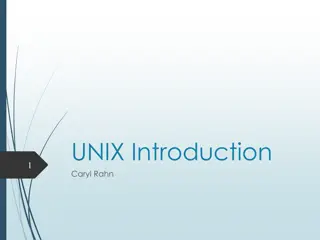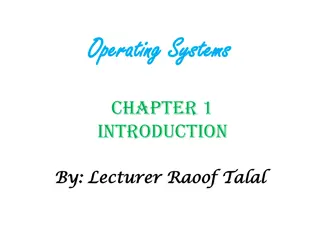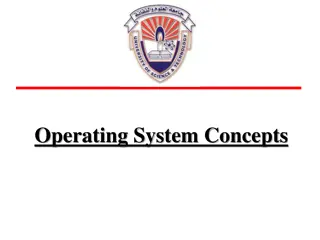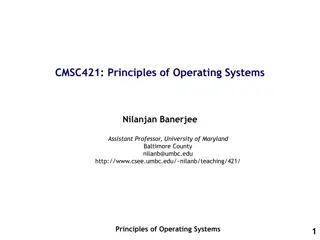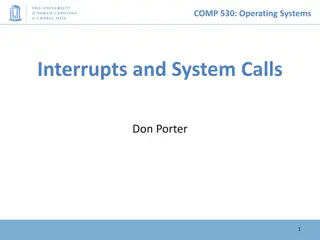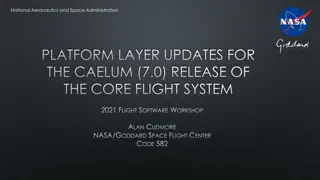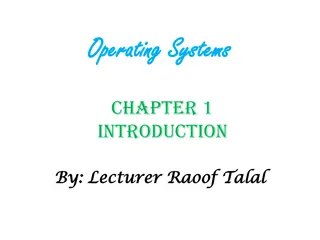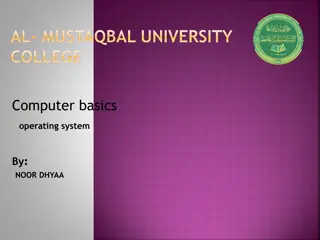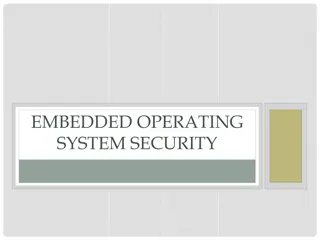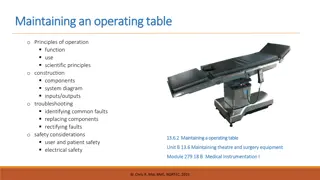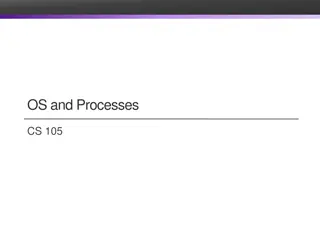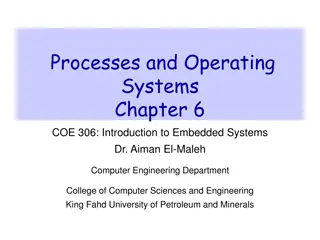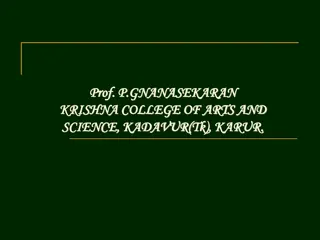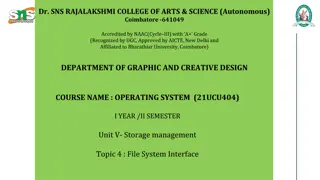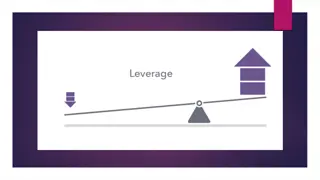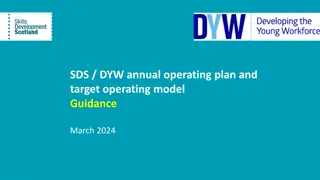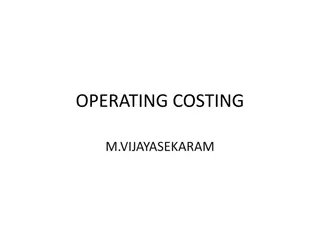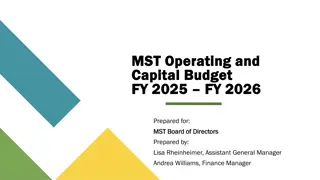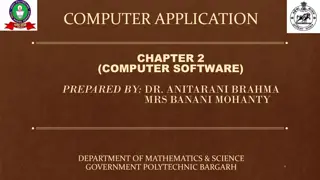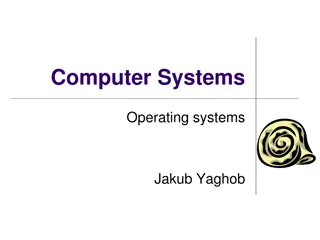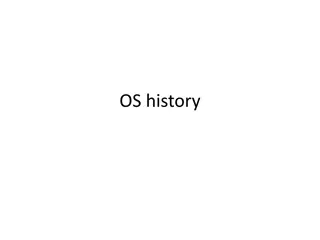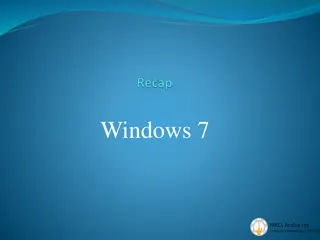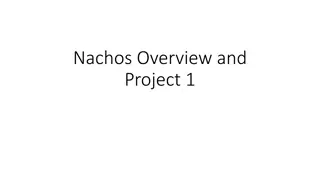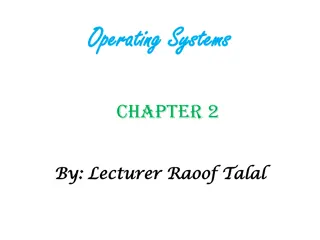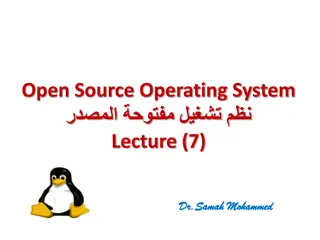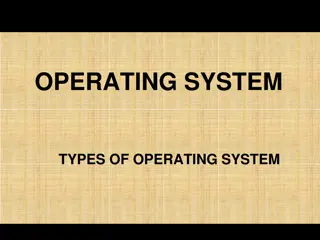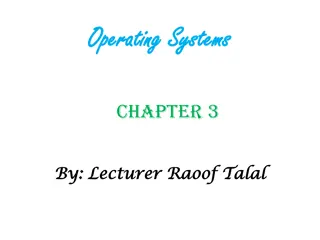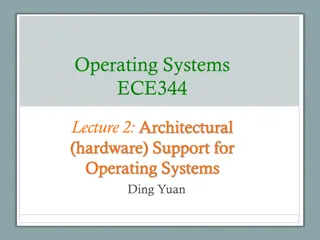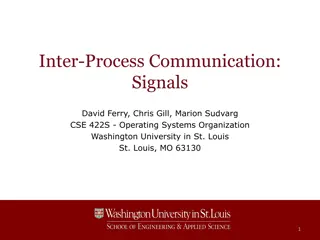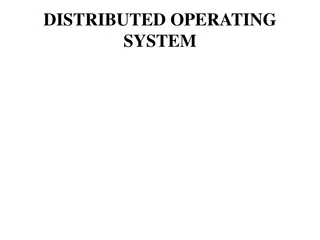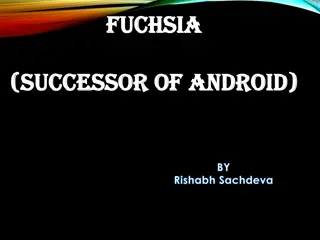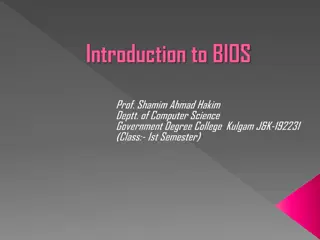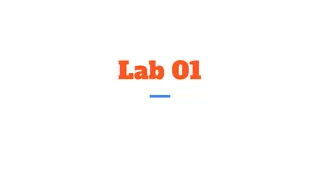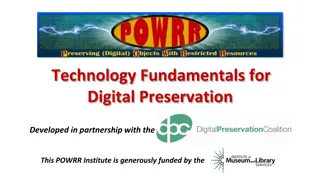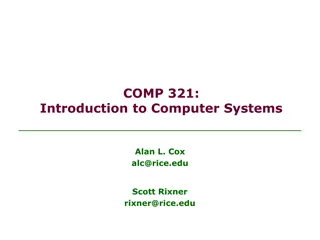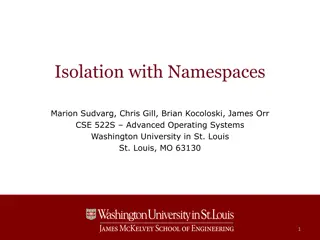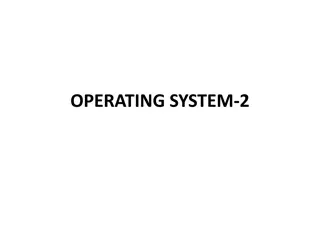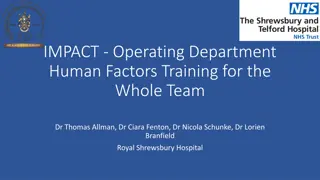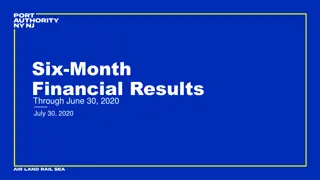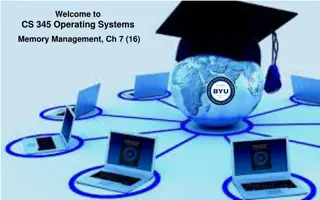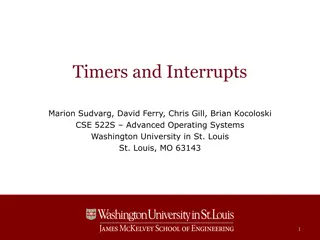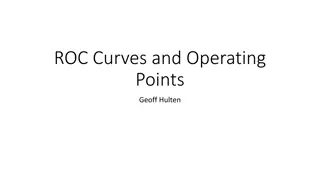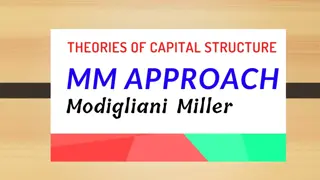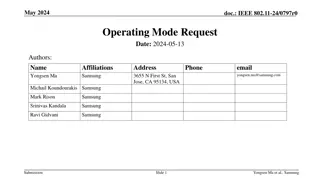Exploring Operating System Fundamentals: An Overview
Delve into the world of operating systems with a comprehensive exploration of key concepts, historical developments, and emerging challenges. Understand the importance of studying operating systems in gaining insights into computer functionality and system abstraction levels. Discover a wealth of resources, lectures, and teaching staff to guide you through this fundamental aspect of computing.
Download Presentation

Please find below an Image/Link to download the presentation.
The content on the website is provided AS IS for your information and personal use only. It may not be sold, licensed, or shared on other websites without obtaining consent from the author. Download presentation by click this link. If you encounter any issues during the download, it is possible that the publisher has removed the file from their server.
E N D
Presentation Transcript
Introduction inf-2201 Operating System Fundamentals Spring 2019 Lars Ailo Bongo (larsab@cs.uit.no)
Multics IBM OS/360 IBM VM/370 MS-DOS Unix es Mach L4 Exokernel Barrelfish Corey/ The Library OS Tesselation Vortex
Application Operating System Operating System Hardware OS es for many different types of devices Differing requirements (functionality, footprint, real-time) and applications Abstractions and many design issues are still shared
New challenges 1000s of cores TB s of memory 100 000s of machines GPU, TPU, accelerators Power usage Sensors Privacy
Outline How? Why? What?
Teaching staff Lectures: Prof. Lars Ailo Bongo Associate Prof. Tore Brox-Larsen Teaching Assistants: David Kristoffersen Simon Solnes Jo Inge Arnes Our external sensor
Resources Web page: http://www.cs.uit.no/kursinfo/inf2201 Lecture plan, including readings and slides Project plan Slack team: uit-inf-2201-s19 Discussions GitHub organization: https://github.com/uit-inf-2201-s19 Project pre-code Your solutions Issues Wiseflow?
TODO list 1: 1. Join Slack team 2. Create GitHub account 3. Add your email and GitHub username to list 4. Wait for GitHub organization invite
Why Study Operating Systems Understand how computers work under the hood You need to understand the system at all abstraction levels or you don t (Yale Patt, private communications) The devil is in the details (Unknown) Magic to provide infinite CPUs, memory, devices, and networked computing. Tradeoffs between performance and functionality, division of labor between HW and SW Combine language, hardware, data structures, algorithms, money, art, luck, and hate/love And operating systems are key components in most systems
How to Study Operating Systems? Read text Smaller exercises using existing operating systems Modifications to exisiting systems Emulator NachOS Metal , bare machine Unix, Linux Minix Develop your own! Gain experience on fundamental issues
Why Build a Real OS Kernel? Hear and forget (Paper approach) See and remember (Exercise and Modification approaches) Do and understand (Roll your own approach) Overcome the barrier, dive into the system Gain confidence: You have the power, not the SW, OS and computer vendors
Our Approach 6 projects, all mandatory From boot to a useful OS kernel w/demand paging & file system We hand out templates (pre files), but never the finished source (post files) New bugs discovered every time the course is given Lectures and Projects are (almost) synchronized Design Review during first week of each project Linux, C, assembler Close to the computer, but bochs useful to reduce the number of reboots
Project OS History LurOS LurOS Stein Krogdahl, OS course, Dept. of computer science, UiT , ca. 1978 Paper, but detailed Mymux Mymux (Mycron Multiplexer) Stein Gjessing (1979?), later implemented and reworked by Otto Anshus (1981), OS course, Dept. of computer science, UiT , around 1981-82-83 Mycron 1 (64KILObyte RAM, no disk, 16 bit address space, Intel 8080/Zilog 80, Hoare monitors, flermaskin (3, UART, 300 bits/sec, transparent process and monitor location, process and monitor migration between machines) POS POS (Project Operating System), a.k.a. TeachOS Otto Anshus, Tore Larsen, first implementation by ge Kvalnes (Brian Vinter), OS course, Dept. of computer science, UiT , 1994-1998 Notebooks, Intel 486/Pentium Princeton University, USA Kai Li (1998), adopts and enhances the projects Troms & Princeton D240/COS 318, Kai Li, Otto Anshus, 1999 Troms /Princeton/Oslo Inf-2201/COS318/INF242, 2001, Vera Goebel, Thomas Plagemann, Otto Anshus Yale University TeachOS, a.k.a. LearnOS LearnOS
Course Approach You will be building your own operating system You will do it in steps For each step We ll define what your OS should achieve for this step We ll provide you with a starting point (code) You may well choose to use your own starting point You will contemplate a design and present a brief design report indicating design issues, discussions, and decisions. The design report is presented, discussed, and reviewed by staff You develop and implement your solution. The solution is reviewed etc. For each step you will sweat By early June you will be King of the hill!
Literature Modern Operating Systems 4/E, by Andrew (Andy) Tanenbaum, Prentice- Hall, 2015 All information given on the course web pages. The links provided are mandatory readings to the extent they are relevant to the projects We will also provide additional readings. Please, check the syllabus All lectures, lecture notes, precept notes and topics notes All projects Other books that may help you are: Protected Mode Software Architecture, by Tom Shanley, MindShare, Inc. 1996. This book rehashes several on-line manuals by Intel Undocumented PC, 2nd Edition, by Frank Van Gilluwe, Addison-Wesley Developers Press, 1997 The C Programming Language, Brian W. Kerningham, Dennis M. Ritchie Note! Lectures covers important topics that are not addressed by Note! Lectures covers important topics that are not addressed by projects projects
Cooperation Policy: Working with your fellow students Discuss all concepts, techniques, technologies, and peculiarities with your fellow students But don t in any way share your own code or copy code that is not developed by you.
Learning from Doing: Each student develops his/her own code INF-2201 har en eksamensordning hvor oppgaver i kurset vurderes og gis veiledende karakterer som ved kursets slutt danner utgangspunkt for den endelige fastsettingen av karakter for kurset. P grunn av dette vil f lgende bli betraktet som fusk iht. Forskrift for eksamener ved Universitetet i Troms : Deling av kode (b de i elektronisk og annen form) utviklet i forbindelse med oppgavene i kurset. Kopiering av hele eller deler av l sning p oppgavene utviklet av andre. Av hensyn til gjennomf ring og karaktersetting for kurset i framtiden m kode og kursmateriale ikke p noe tidspunkt deles eller distribueres til andre enn faglig og administrativt personale ved UiT med ansvar for gjennomf ring av kurset.
Grading Policy Mappe evaluering : X individual grades: combined to give final grade No written exam Wiseflow More details TBA Note! It is your responsibility to make sure you submit Note! It is your responsibility to make sure you submit the correct assignment on time the correct assignment on time
Grading Mechanism 100 point scale (A is 90-100) Extra credits are additional to 100 ordinary point You can get an A without doing extra credits But hard in practice Examiners follow grading guidelines: Each part of assignment gives X points Most points are for code correctness Some are for code readability (comments, structure) A few are for documentation Examiners may give short explanation for grades < A You should discuss your code/ solution with TAs
TODO list 2 Read MOS 1.1-1.5 Learn GNU assembly syntax Learn to use git/ GitHub


